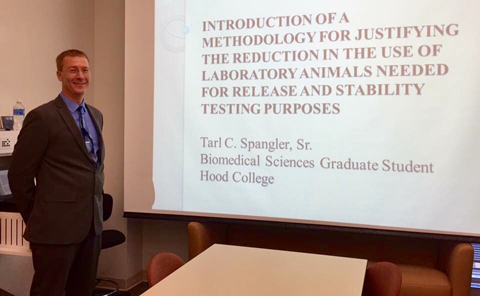Hood Biomedical Sciences Student Shares His Field Project Experience

Tarl Spangler, a master's degree candidate in biomedical sciences with a concentration in regulatory compliance, works as a scientist in the BioDefense Division of Emergent BioSolutions Inc. Here’s what he has to say about his experience at Hood.
Tarl Spangler
Graduation Year
2016
Program
- Biomedical Science (M.S.)
Department
- Biology
Background
I am a currently enrolled at Hood College for a Master’s in Biomedical Sciences with a concentration in the Regulatory Compliance (graduating in Fall 2016). I have worked in the biotech field since graduating with my Bachelor’s degree in Biology (Frostburg State University, 1997). My main field of expertise is vaccinology. I serve as a Study Director with a group working on next generation anthrax vaccines. My career goals include applying my newly acquired knowledge of regulatory compliance within my current career path. I hope to transition into Regulatory Affairs after obtaining my Regulatory Affairs Certification (RAC).
Why Hood College
My decision to attend Hood College was multifaceted. I had familiarity with Hood College from when I took a pre-college topics biology class from Frederick High School. My biology teacher at the time encouraged me to take a class that was offered at Hood College to high school students. I also live in Frederick, MD; therefore, the proximity of the school to my home was appealing. Finally, Hood College had a program that was catered to exactly what I was looking for in a Master’s program (Regulatory Compliance)! And, the fact that Hood College just finished building an impressive sciences building (Hodson) was nothing to sneeze at either.
What have you enjoyed most about your time at Hood?
Life is all about the relationships you build. The people who come into your life and leave an impression upon you are who nurture you into the person you choose to become. I have enjoyed the relationships that I have made with my peers the most. Students and professors alike!
Why did you decide to do a field project?
I felt that a field work project was the more difficult way to graduate over taking a test at the end. I wanted to challenge myself. I also wanted to make a meaningful impact to my field through my field work project and have something to show for it… have something to be proud of.
What was your field work project about? What were the highlights of that experience?
My field work project was entitled “Methodology for Justifying the Reduction in the Use of Laboratory Animals Needed for Release and Stability Testing Purposes”. I used computer simulation techniques to suggest a 25% reduction in the number of animals required to calculate release and stability indicating relative potency values for anthrax vaccines. This required long hours after work in front of the computer learning how to write simulation programs using statistical analysis software (SAS®) with my friend, and biostatistician, Dr. Sweeney, who also served on my reading committee. The biggest highlight was my successful oral defense and approval of my project!
What advice would you give future graduate students about Hood and about your program?
My bits of advice for students who are choosing to take the thesis/field work project path toward graduation would be:
- Start thinking about your theism/field work project topic when you begin your program!
- Use the information you get from your classes to find a topic you are “passionate” about. THIS is majorly important!
Don’t wait until the end of the program to come up with your topic. Although I am graduating, I waited late in the game to decide upon my field work project topic. The final class in the thesis/field work project path toward graduation is BMS 580/585. This class helps you develop your topic into a “pre-proposal” which is required to be submitted to the graduate school. I did not have my topic locked down at this point. The topic I chose during the class, I ended up not being passionate about. It was not until halfway through the class that I realized that fact and I had to develop a new topic rather quickly. This experience made me wish I had started working on my project MUCH earlier! It’s NEVER too early to start on your topic. Bounce your ideas off of your peers and professors. This is also a great way to start finding professors who could possibly serve on your reading committee.
Are you ready to say Hello?
Choose a Pathway
Information will vary based on program level. Select a path to find the information you're looking for!
